- The top-selling smartphone in 2025 so far might surprise you - here's why
- Apple Intelligence hasn't lived up to my expectations, but these 3 upgrades could win me back
- Samsung launches One UI 8 beta - what's new and how to join
- This 230-piece Craftsman toolset is still just $99 at Lowe's
- Grab this 85-inch Samung TV and home audio bundle for $2,500 off
Surfshark vs NordVPN (2024): Which VPN Should You Choose?

If you look up the best VPNs available today, chances are both Surfshark and NordVPN top the list. As two popular providers, both services bring quality VPN performance with their own standout features.
Surfshark brings a ton of value with its affordable pricing across its plans and the ability to connect an unlimited number of devices at the same time. On the other hand, NordVPN brings consistently fast VPN speeds and a massive 111-country server network.
In this article, we help you figure out which of the two VPNs is best for you and your organization.
- Surfshark: Best for budget-conscious users that want a quality VPN that can accommodate an unlimited number of devices
- NordVPN: Best for most businesses looking for an all-around VPN, with fast performance, additional security features, and a polished user experience
Surfshark vs NordVPN: Comparison table
While both Surfshark and NordVPN have broad platform support, they have key differences in terms of their pricing and server network.
| Our rating | ||
| Security protocols | ||
| No. of servers | ||
| VPN server locations | ||
| Simultaneous device locations | ||
| Supported platforms | ||
| Free trial | ||
| Starting price | ||
|
|
Surfshark and NordVPN: Pricing
Both Surfshark and NordVPN have three subscription tiers, with varying feature inclusions in each plan. In addition, both offer monthly, one-year, and two-year plan options for each subscription tier.
SEE: How to Run a Cybersecurity Risk Assessment in 5 Steps (TechRepublic Premium)
Surfshark VPN pricing
Surfshark has three subscription tiers: Surfshark Starter, Surfshark One, and Surfshark One+. Starter includes the main VPN service, while One+ bundles in the most amount of additional features.
Below is a summary of pricing and feature differences with each tier:
| Starter | One | One+ | |
|---|---|---|---|
| Monthly | $15.45 per month | $15.95 per month | $17.95 per month |
| 1 year | $2.99 per month | $3.39 per month | $6.09 per month |
| 2 years | $2.19 per month | $2.69 per month | $4.29 per month |
| Features | Includes main VPN and ad blocker | All Starter features plus masked email generator, antivirus, and real-time email breach alerts | All One features plus data removal from company databases and people search sites |
Personally, I think the Surfshark One subscription for one year brings the best balance of value and feature set. At $3.39 per month, it’s significantly more affordable than NordVPN’s equivalent plan but still includes nifty extras like antivirus and breach alert capabilities as well.
SEE: Surfshark vs CyberGhost (2024): Which VPN Is Better? (TechRepublic)
While I would have loved it if Surfshark offered a free version, it fortunately has a seven-day free trial via iOS, Android, and macOS. It also has a 30-day money-back guarantee for all its subscription plans, giving you a chance to refund your initial subscription if you feel it isn’t a good fit.
If you want to learn more, read our full Surfshark VPN review.
NordVPN pricing
NordVPN’s paid plans have three subscription tiers, namely NordVPN Basic, Plus, and Complete. Like Surfshark, all three NordVPN plans have a monthly, a yearly, and a two-year plan.
Below is an overview of pricing and feature differences with each tier:
| Basic | Plus | Complete | |
|---|---|---|---|
| Monthly | $12.99 per month | $13.99 per month | $14.99 per month |
| 1 year | $4.99 per month | $5.99 per month | $6.99 per month |
| 2 years | $3.09 per month | $3.99 per month | $4.99 per month |
| Features | Includes main VPN | All Basic features plus Threat protection, anti-malware protection, ad blocker, and cross-platform password manager | All Plus features plus 1TB encrypted cloud storage |
For NordVPN, its one-year Plus subscription is what appeals to me the most. Even if it’s not as affordable as Surfshark’s One plan, I feel like NordVPN Plus at $5.99 per month still brings good value considering it includes the full VPN and a full-fledged password manager bundled in. This can be ideal for individuals who want a suite of security tools from a single software provider.
SEE: Private Internet Access (PIA) vs NordVPN: Which VPN Is Better? (TechRepublic)
Luckily, NordVPN also has a seven-day free trial and a 30-day money-back guarantee for all its plans, enabling refunds after an initial purchase. Unfortunately, the free trial is only accessible via Android. To me, the ideal situation is to at least have the free trial available to both iOS and Android users, so that access is fair regardless of which smartphone ecosystem you use.
Thankfully, it is fairly easy to test NordVPN on desktop after accessing the free trial on Android — which is how I tested one of NordVPN’s premium subscriptions.
If you want to learn more, read our full NordVPN review.
Surfshark vs NordVPN: Feature comparison
Here’s a side-by-side comparison of NordVPN and Surfshark, focusing on seven key features:
Security protocols and encryption
Winner: Tie
Both NordVPN and Surfshark include a solid mix of VPN protocols that cover both security and speed. To me, a quality VPN should at least have the security-centric OpenVPN protocol and the speed-oriented WireGuard protocol. Everything else is an extra.
Fortunately, NordVPN comes with OpenVPN and its proprietary NordLynx protocol that’s based on WireGuard. On the flipside, Surfshark carries OpenVPN, WireGuard, and IKEv2 VPN protocols.
SEE: Surfshark vs IPVanish (2024): Which VPN Should You Choose? (TechRepublic)
In terms of encryption, both services utilize the industry standard AES-256 encryption algorithm. This is crucial, as AES 256 is widely recognized as one of the most secure encryption algorithms today, so much so that it’s used by some United States government entities to secure sensitive data against prying eyes.
With this, our first round is a clear tie, with both NordVPN and Surfshark hitting the mark when it comes to security protocols and encryption.
VPN server network and locations
Winner: NordVPN
NordVPN gets the win when it comes to server networks and VPN locations. As of August 2024, NordVPN has 6,400+ servers spread across 111 countries. In contrast, Surfshark VPN currently has 3,200+ servers in 100 countries within its network.
While NordVPN’s lead in terms of actual server count is significant, I place more weight on Nord having more server/country locations compared to Surfshark. Even if having 11 more countries doesn’t seem like much, it still means NordVPN provides a bit more country options to its users than Surfshark.
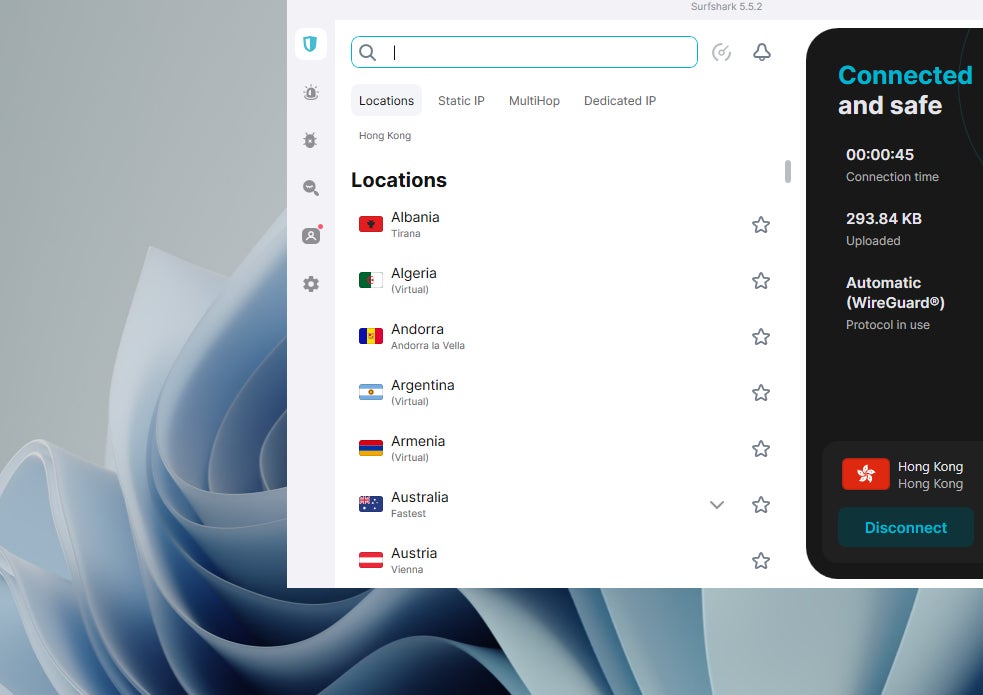
That isn’t to say that Surfshark’s 100-country server fleet isn’t solid. It is — it just so happens NordVPN currently has a slight advantage country-wise. Given how one of the main purposes of a VPN is to unblock geo-restricted content by changing IP locations, NordVPN’s 111-country server suite is a definite plus.
SEE: PureVPN vs NordVPN (2024): Which VPN Should You Choose? (TechRepublic)
For businesses that have unblocking as their main priority with a VPN, NordVPN is the better choice.
Third-party audits and track record
Winner: Surfshark
As far as third-party testing and overall track record go, I give the win to Surfshark. While NordVPN technically has more independent audits than Surfshark — having four compared to three — I appreciate Surfshark giving the public an actual summary of their audit results and access to the full report.
Surfshark’s most recent independent audit was published in 2023, where Deloitte confirmed that Surfshark’s “IT systems and management of the supporting IT operations is properly prepared, in all material respects, in accordance with Surfshark’s description of its no-logs policy.”
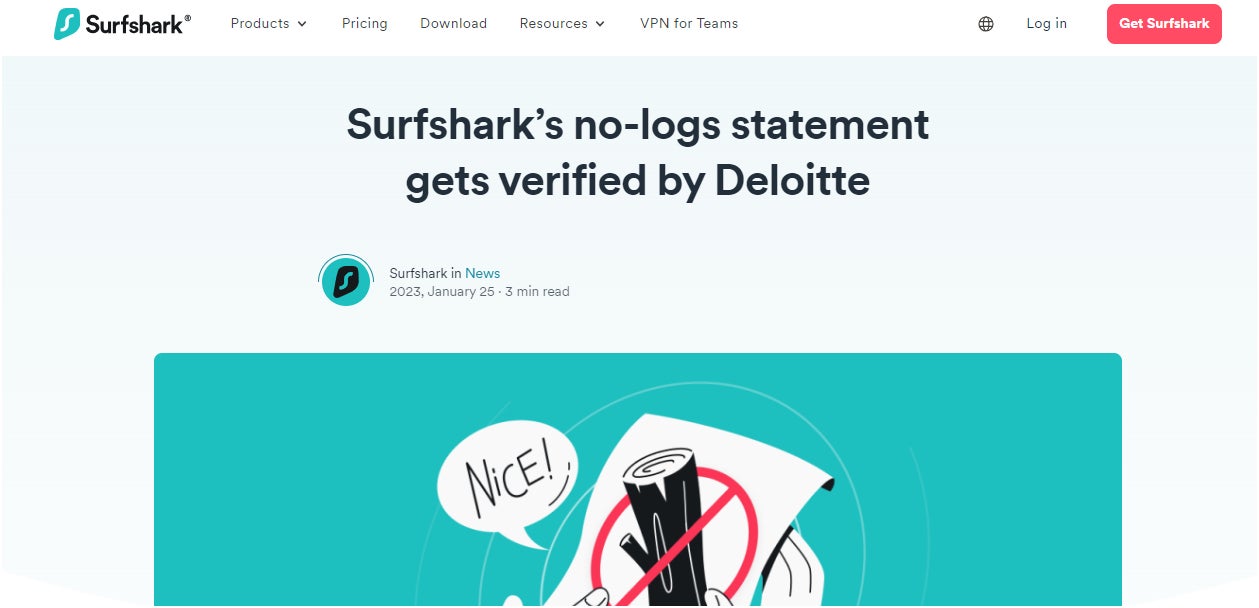
In contrast, NordVPN has completed an impressive four independent audits of its no-logs policy as of January 2024. However, if we look at its most recent audit, also conducted by Deloitte, the results are only available for people with a NordVPN account.
According to NordVPN, this was done “[d]ue to the extensive nature of the audit, excerpts from the report cannot be shared directly. This measure ensures the audit results are not taken out of context or misunderstood.”
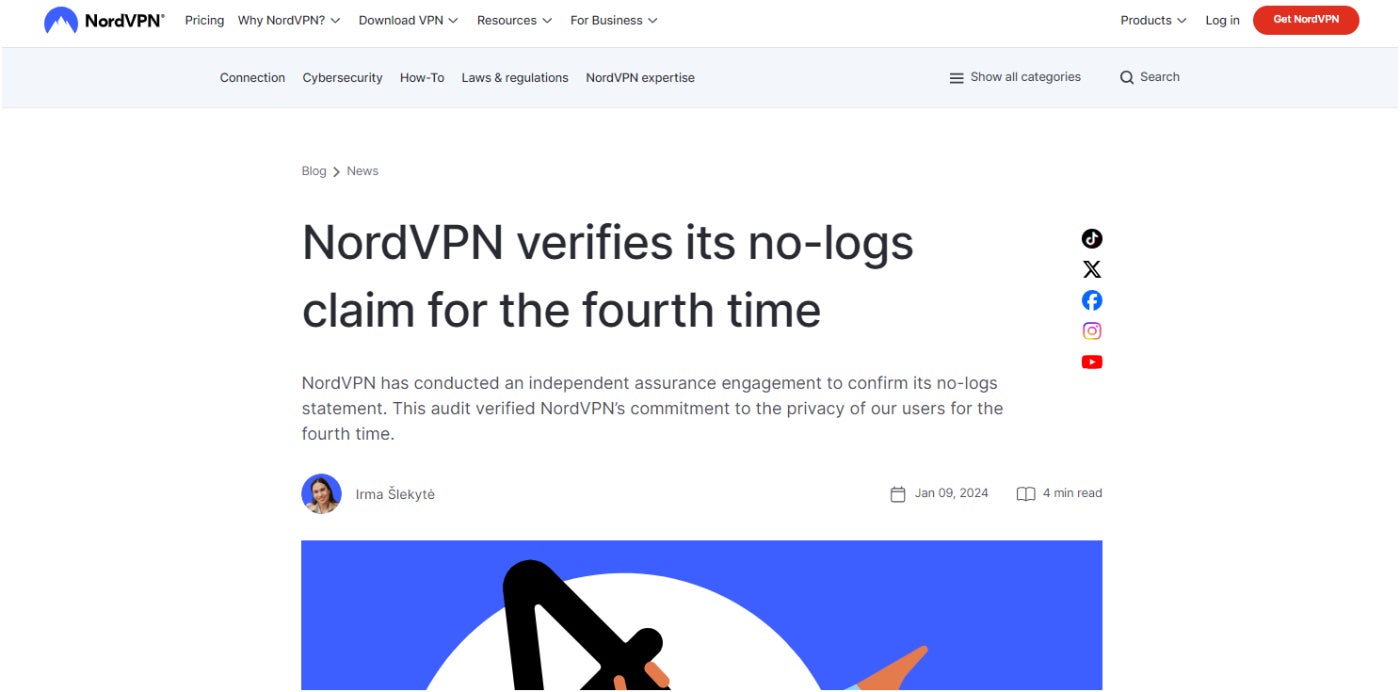
While I understand the risks of publishing a full audit report and how findings could be blown out of proportion, I appreciate Surfshark’s more accessible approach to sharing its audit results with the public. This is especially impactful if you’re a prospective user who doesn’t necessarily have an existing account in either service yet.
SEE: The 5 Best VPNs with Free Trials in 2024 (TechRepublic)
Despite giving the win to Surfshark, I do commend both VPNs for showing full commitment to having their services independently tested and evaluated.
Standout features
Winner: NordVPN
Looking into standout features, I give the point to NordVPN. On top of its VPN service, Nord includes a ton of security and privacy features that make for a formidable package. It includes a dedicated malware and ad blocker, a dark web monitor, and even an option for encrypted cloud storage.
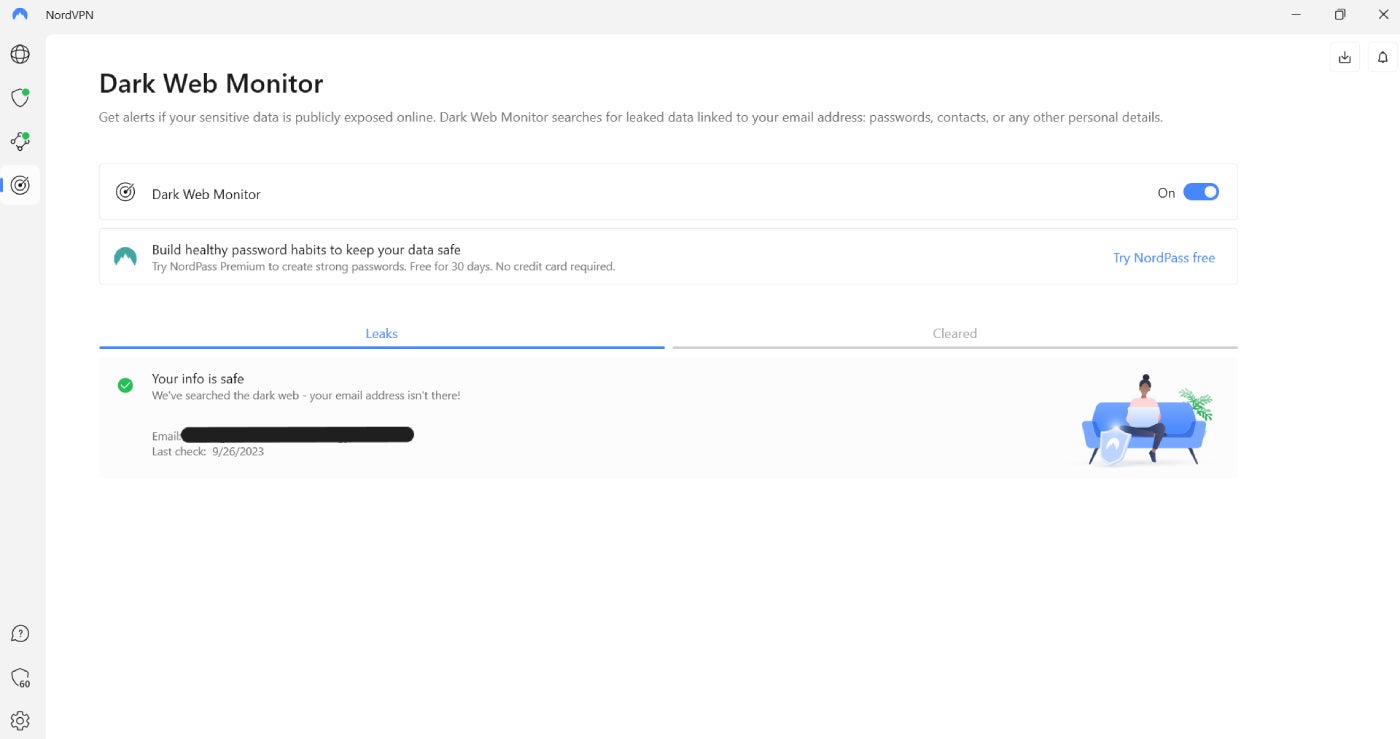
It also has a cool Meshnet feature that lets users create their own privacy encrypted networks, which they can use to share files or access devices more securely.
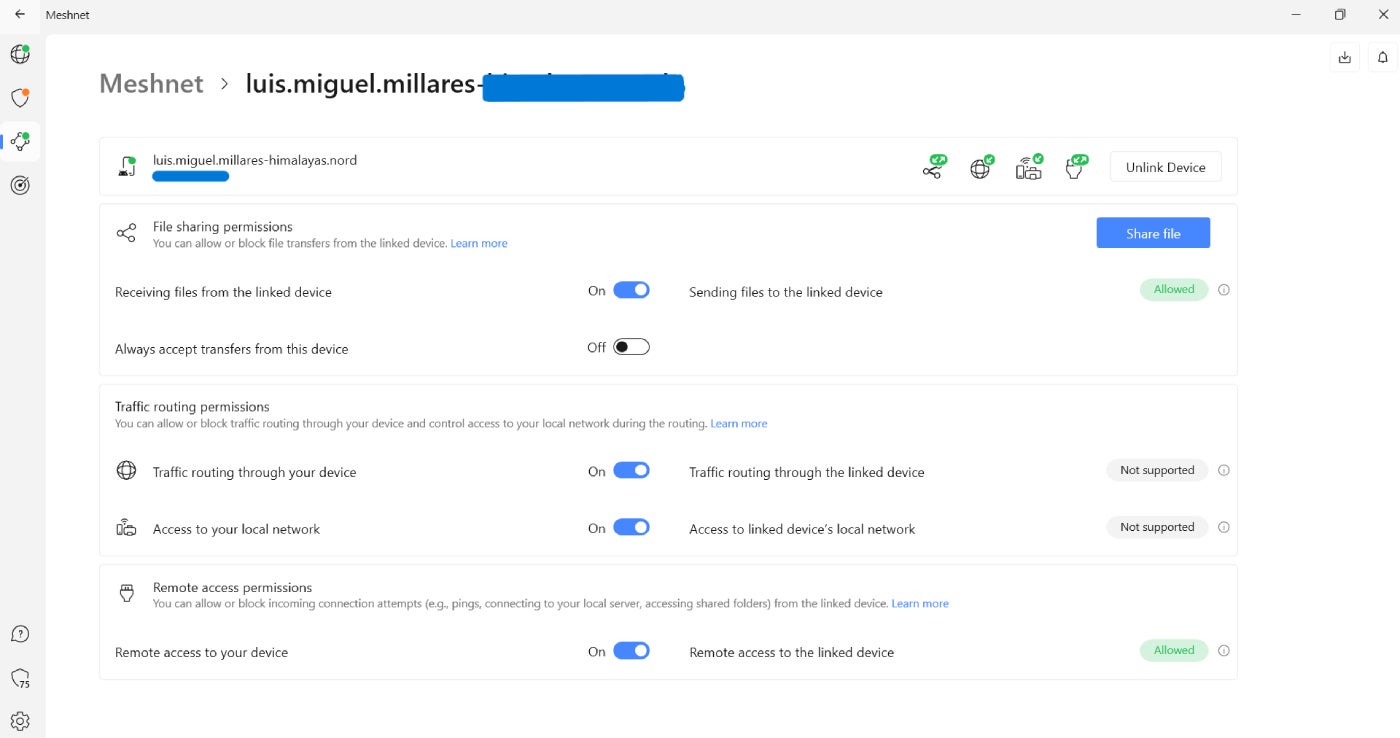
My personal favorite is the fact that a NordVPN Plus subscription actually gives users a NordPass account — Nord Security’s own password manager. That gets you both a VPN and a password management service with one subscription. If you want to learn more, check out our full NordPass review here.
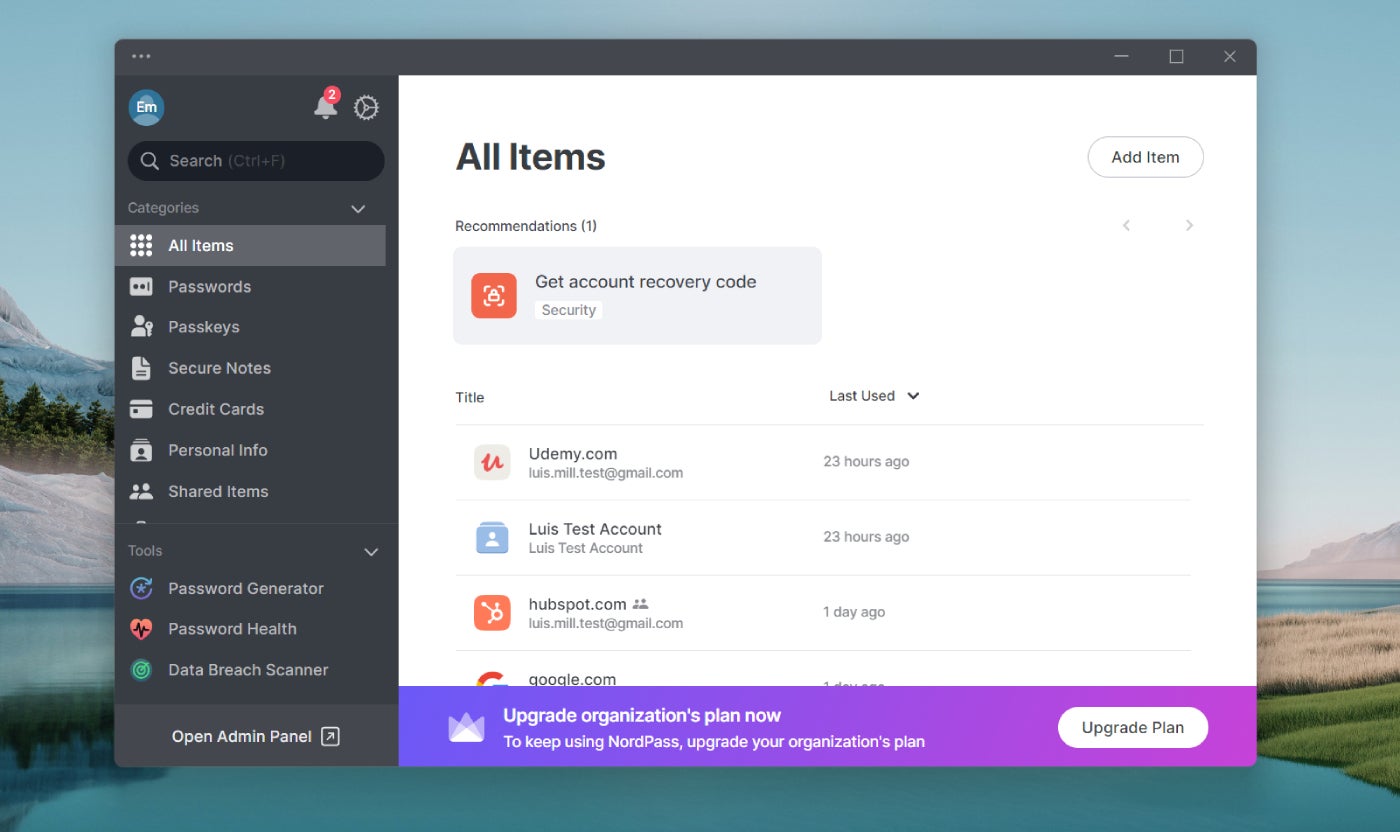
Meanwhile, Surfshark has noteworthy features of its own. It has a built-in antivirus service with its Surfshark One plan, a masked email generator, and its CleanWeb ad blocker for a cleaner online browsing experience.
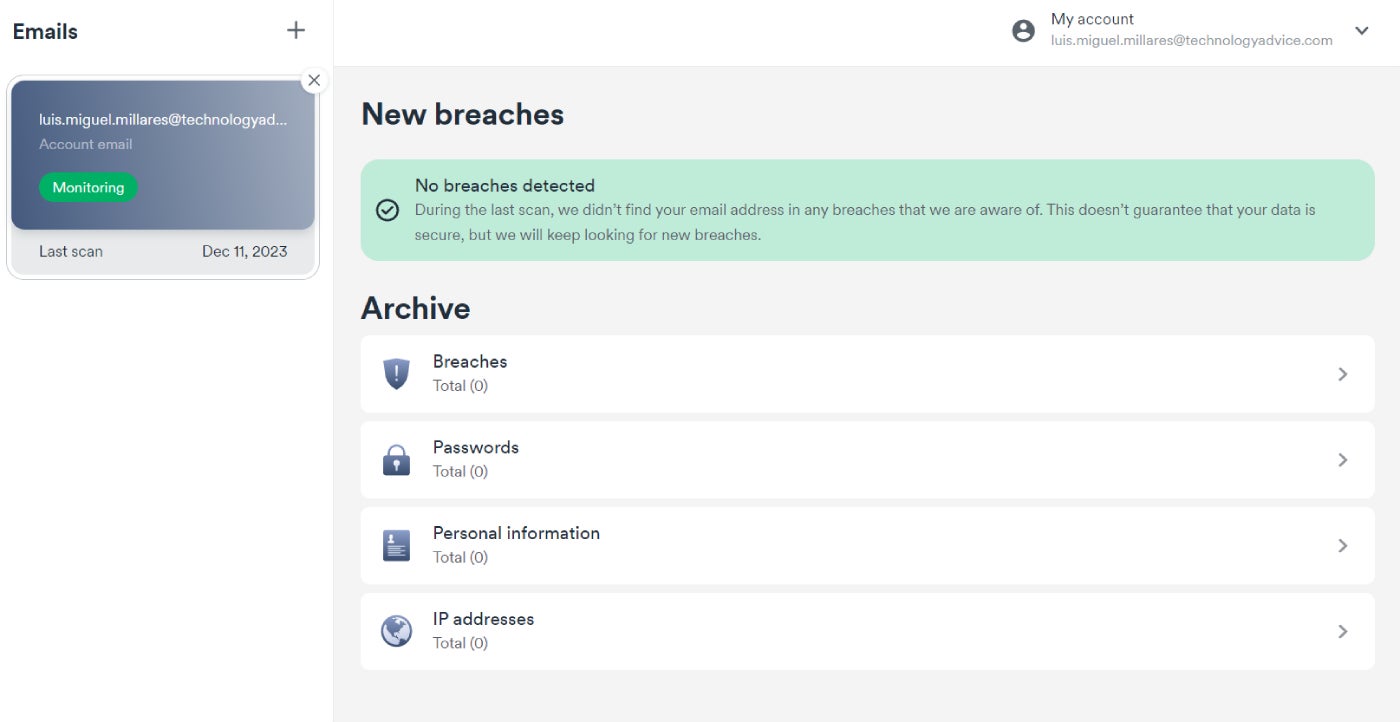
We get double VPN and split tunneling functionality from both NordVPN and Surfshark, as well as RAM-only servers in their respective server fleets.
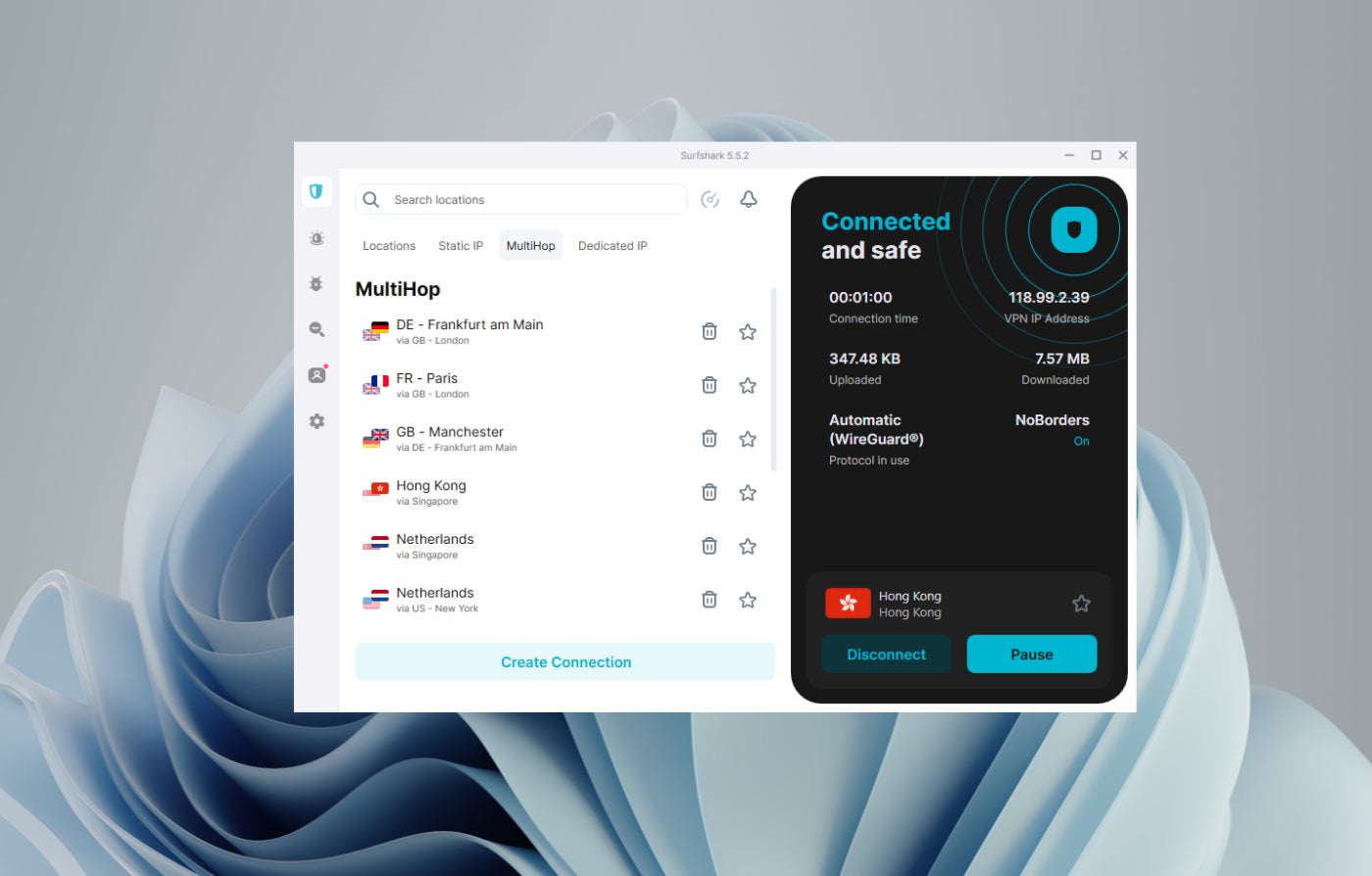
Overall, I think NordVPN provides a slightly more well-rounded feature suite, with the addition of the NordPass password manager being a particular highlight for me.
Performance and speed
Winner: NordVPN
For VPN speed and performance, NordVPN takes the cake. In my experience, both Surfshark VPN and NordVPN are able to provide reliable and fast speeds for everyday tasks.
During testing, I used both VPNs for my usual workflow as a writer. This involved going through multiple websites for research, attending online video meetings, and streaming the occasional 1080p video on YouTube. Qualitatively, I had zero trouble using both VPNs speed-wise and can confidently recommend both if you’re looking for a fast-performing VPN.
However, speed testing is where NordVPN takes the advantage over Surfshark. As VPNs add another step to your traffic, it’s expected that we see a decrease in overall speed compared to your internet service provider.
Per my testing, NordVPN recorded excellent speeds — having only a 5.8% decrease in download speed and a 16.2% decrease in upload compared to my ISP. In contrast, Surfshark had a 3.34% decrease in download speed and a more significant 72.1% drop in uploads.
With this, if your business is strictly looking for the faster VPN service, my testing showed that NordVPN is the better choice.
Ease of use and design
Winner: Tie
With ease of use, user experience, and design, I found both Surfshark and NordVPN had polished and intuitive applications.
Taking each application one-by-one, we see that NordVPN brings a minimalist user interface that I found pleasant to use and navigate. Even with its breath of features, everything was neatly organized, and I had no trouble using its features and establishing a VPN connection.
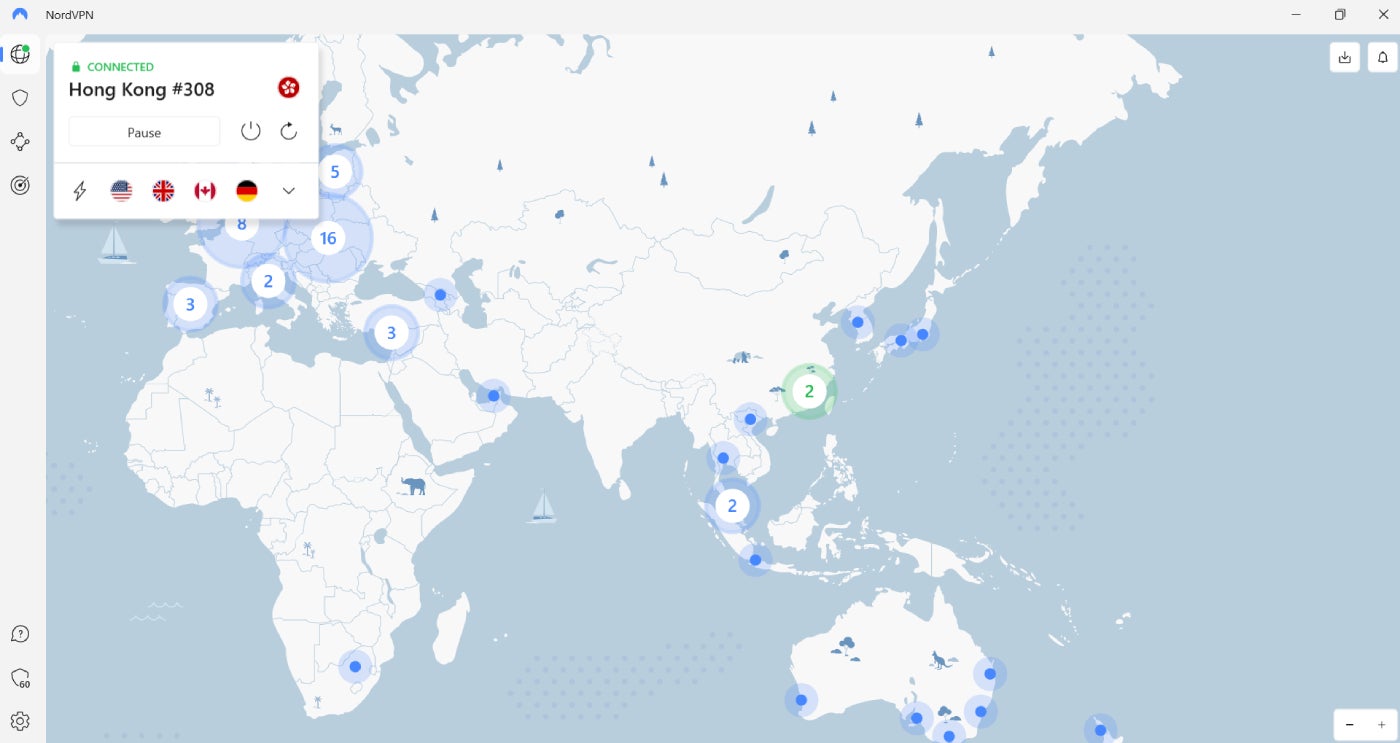
The same was true with Surfshark’s desktop app. It comes with a similar, light-themed UI that’s well-organized and easy on the eyes. I particularly like how Surfshark gives users a clear board of stats on the right of its main interface, showing connection time, connection status, and which VPN protocol you’re using (see below).
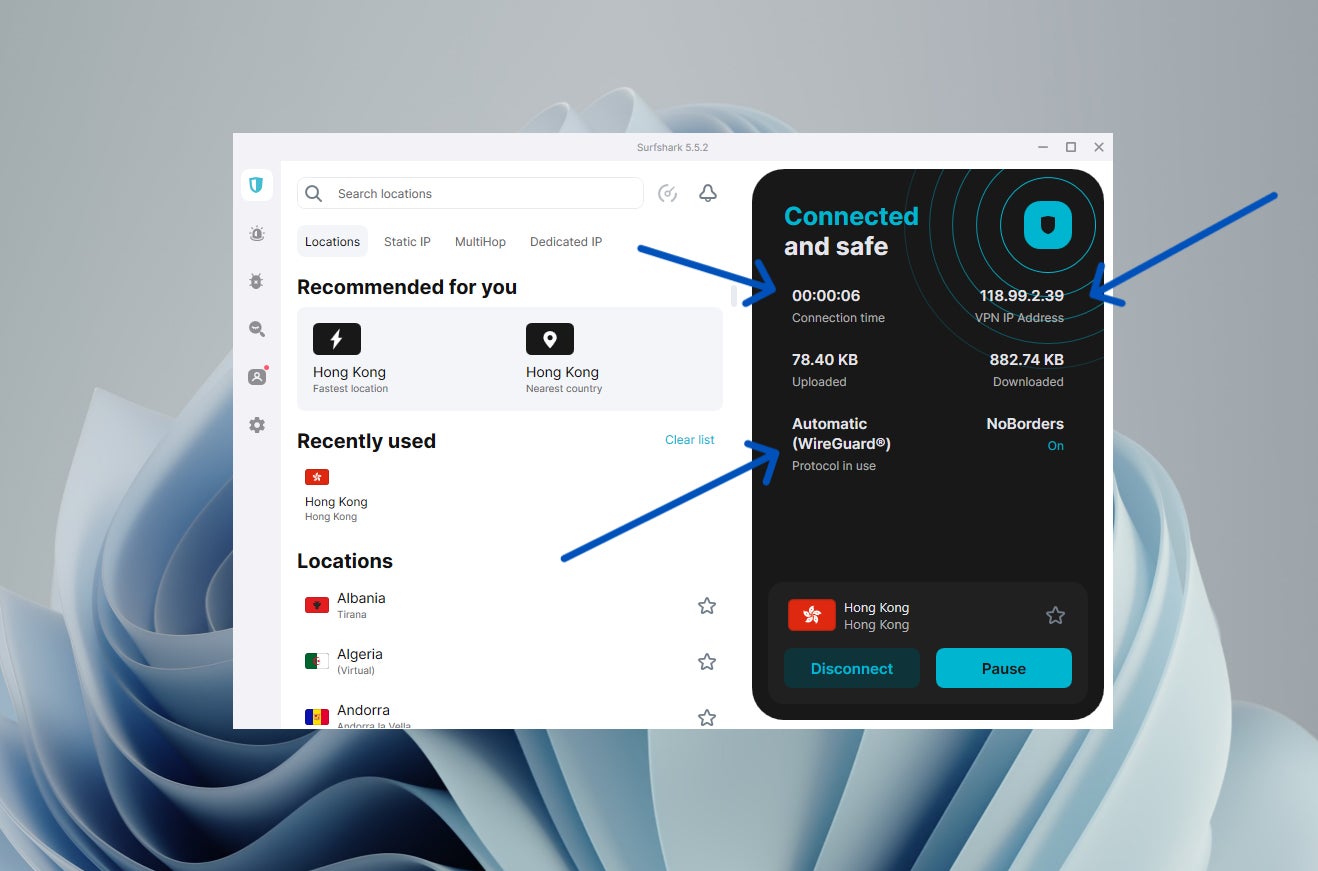
Both VPN apps also performed reasonably well, with no major issues in terms of activating features or establishing VPN connections. For me, ease of use and design are where NordVPN and Surfshark show their polish compared to the competition.
Whether you choose Surfshark or NordVPN, you’ll get access to a refined VPN user experience that won’t leave you annoyed or confused.
Simultaneous device connections
Winner: Surfshark
For device connections, Surfshark takes the clear win. Surfshark allows users to connect to an unlimited number of devices all at the same time. This means you can have a handful of smartphones, laptops, computers, and other devices connected to a VPN server without worrying about a device limit.
On the other hand, NordVPN currently allows a maximum of 10 simultaneous device connections. To be fair, 10 will most likely be enough for most individual users. However, if you’re a small business that requires numerous team members to connect their devices to a VPN, Surfshark’s unlimited connections is your best bet.
Personally, I find Surfshark’s unlimited simultaneous connections adds incredible value to the VPN’s already affordable subscriptions. This is especially true when we consider that NordVPN, even with its abundance of extra features, is still a bit more expensive than Surfshark.
Surfshark pros and cons
Pros
- Unlimited simultaneous device connections.
- Easy-to-use and well-designed interface.
- CleanWeb feature that blocks ads, trackers, and malware.
- Affordable subscription options.
- More accessible third-party audit results.
Cons
- Smaller server fleet compared to NordVPN.
- Less consistent speed test results.
NordVPN pros and cons
Pros
- 111-country server fleet; 6,400+ servers.
- Polished desktop application.
- Fast and consistent VPN speeds.
- Meshnet encrypted file sharing feature.
- NordVPN Plus subscription includes NordPass password manager.
Cons
- Slightly more expensive compared to Surfshark.
- Only allows for 10 simultaneous device connections.
- Third-party audit results require a NordVPN account.
Should your organization use Surfshark or NordVPN?
After a tough match-up, I give NordVPN the win as my recommendation for most businesses and individuals. It offers a massive server fleet with 6,400+ servers across 111 countries, includes a bunch of extra security features, and provides consistently fast and reliable VPN speeds.
I particularly appreciate NordVPN’s all-around quality of service with its VPN, as it doesn’t skimp out on in-app experience, security capabilities, and VPN performance.
This isn’t to discredit Surfshark, however. Surfshark’s refined user experience, solid 100-country server suite, and unlimited simultaneous connections make it a great choice for more budget-conscious users or organizations.
To me, you really can’t go wrong with either Surfshark or NordVPN, as they’re two of the best VPN services available today.
Methodology
My head-to-head comparison of Surfshark and NordVPN involved an in-depth evaluation of both VPNs’ features, real-world performance, and value.
To assess each VPN, both services were scored on everything from their server networks to their pricing. In particular, I took into account five main pillars, each having corresponding weights:
- Pricing (20%).
- Core VPN features (30%).
- Ease of use (15%).
- Customer support (30%).
- Expert analysis (5%).
I also looked into real user testimonials and reputable reviews to round out my final recommendations for both Surfshark VPN and NordVPN.
For speed and performance, I tested both VPNs on my personal Windows computer and ran them through Ookla’s public Speedtest. Finally, I considered which types of businesses or individual users would best benefit from either Surfshark or NordVPN.

